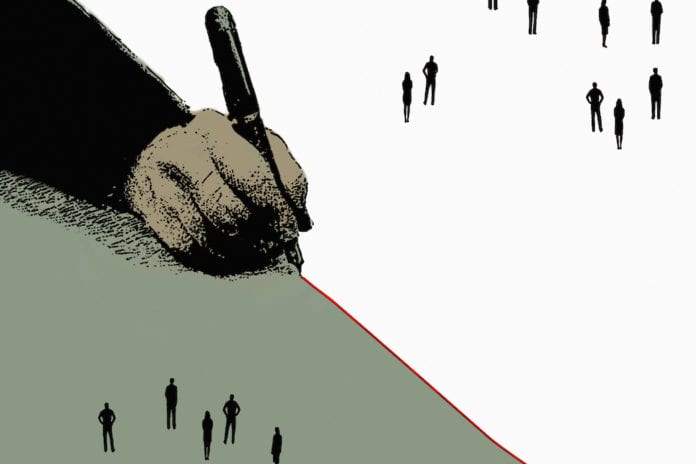“Incredible and startling,” is how Daphne McFerren labels gaps in income, housing and healthcare faced by minorities through systemic exclusion.
McFerren, executive director of the Benjamin Hooks Institute for Social Change at the University of Memphis, opened an event on Monday revealing the 2019 Hooks Policy Papers.
“We look at trends on why people can’t get ahead,” McFerren told about 60 guests in the University Center Bluff Room. Independent researchers proceeded with three presentations and policy recommendations.
White/black income gaps
Economic Challenges Facing Black Men and Boys was presented by Lowell Ricketts, lead analyst, Federal Reserve Bank of St. Louis Center for Household Financial Stability.
Ricketts says, “Black wealth opportunities depend on ‘the presence of black fathers,’ low levels of racial bias and low levels of poverty.”
These findings are troubling given Memphis’ 2019 Poverty Fact Sheet citing a high 27.8 poverty rate, including 20 percent among blacks.
In 2016, black households earned 40 percent less than white households nationwide. While the numbers are extreme, the body of data indicates a gradual decrease in the wealth gap.
Ricketts examined education and wealth.
“A college degree is a powerful tool for upward mobility for all racial groups, but the returns are unequal across groups, even at the highest levels of higher education.”
For example, the median income for black families is 10 cents to the dollar for white families. With a college degree, black families improve from 10 cents to 17 cents.
“Historical discrimination profoundly affects today’s children – existing systemic barriers make it difficult to change wealth gaps.”
Ricketts discussed the research of Raj Chetty, an economist at Harvard University, that compares a teen’s parental income to their income as an adult to predict income mobility (the extent to which children earn more or less than the parents).
Alarmingly, Chetty found that children of high-income blacks are at ‘high risk of downward mobility’ and as likely as low-income black children to land in the bottom income quintile.
“The silver lining is … black girls are just as upwardly mobile as white girls with the same parental income,” says Ricketts.
“Further, black girls’ high school completion and college attendance rates exceed those of white boys,” yet the data doesn’t improve in the overall group.
Chetty’s data shows Memphis has better income mobility than Chicago, but not New Orleans.
“This isn’t due to race, ability or family structure, but a ‘high presence of black fathers’ in the neighborhood.”
Ricketts recommends increasing opportunities for blacks, expanding black male mentors, lowering racial hostility, and making high-opportunity neighborhoods more prevalent.
Excessive black incarceration rates should also be addressed, he says.
Minority health disparities
Dr. Shelly White-Means of The University of Tennessee Health Science Center presented Workplace Settings and Job Types as Determinants of Health Disparities.
“More African Americans are entering the ‘gig market’ to survive, trading traditional jobs for non-standard work,” says White-Means.
She cited rideshare companies Uber and Lyft. Temporary and contract employers don’t typically offer health insurance – this impacts health status.
“Memphis has some of the worst health disparities in the nation. Whether its heart disease, diabetes, stroke or HIV, Memphis stands out.”
White-Means says non-standard workers are mainly minorities, a trend causing a growing racial divide in healthcare coverage.
Following the Great Recession, companies began dropping health coverage to save money. Then, in 2017, non-standard employers showed an uptick in insured workers due to the Affordable Healthcare Act.
“No insurance means no preventive screenings, a lower standard of care and higher rates of premature deaths.”
White-Means says rising wages will keep people from seeking alternative work.
“Wages need to be high enough for families to move out of poverty. When workers have health insurance, they can invest in themselves and be more productive, and employers will make more money.”
“Legislators should give serious consideration to universal health coverage and a living wage.”
“Companies review costs, but what are benefits of expenditures for health insurance, such as a reduction in premature deaths?”
Stifled homeownership
Homeownership is a tool for wealth building in the United States.
Wade Rathke, founder of ACORN (Association of Community Organizations for Reform Now), and Diné Butler, community organizer and policy analyst, explored ways large equity firms are reducing homeownership in Memphis’ low-income neighborhoods.
Rathke said that after the Great Recession, decreases in minority homeownership ensued while increases in alternative mortgages (lease-to-own options) grew. However, lessees rarely end up owning the home.
Following the foreclosure crisis in 2007 and 2008, Butler noticed rises in rental stock, alternative mortgages, contractor deeds and eviction filings.
In 2018, she observed that 20 percent of home purchases in Memphis were made by outside investors and 27,000 evictions were filed between 2017 and 2018.
Rathke says lessees can’t fathom not owning the home in lease-to-own contracts and “some weep after their contract is interpreted.”
Butler says one outside company owns 1,800 local single-family homes and Affordable Housing Management Company, a Memphis-based firm issuing lease-to-own options, owns 1,000. On one contract, ownership is projected in “57 years.”
“Affordability is the key reason people enter these contracts,” says Butler. “People really want to own a home to pass on generational wealth.”
Rathke says, “Private equity companies should be regulated by the Federal Reserve under Community Reinvestment Act policies.”
He touted the Equity Protection Act in Texas that states, if a lessee pays 40 percent of a least-to-own contract, but doesn’t fulfill it, the down payment and repairs will be refunded to recover some of the equity. California and Arizona offer similar protections.
Butler recommends capping rent increases at 2 percent annually to avoid lessors passing repairs on to lessees.
(To see the 2019 Hooks Policy Papers, visit www.memphis.edu/benhooks/.)



